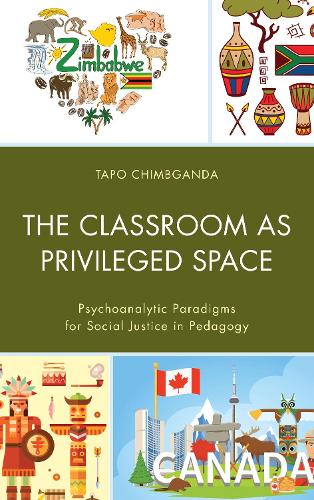
The Classroom as Privileged Space: Psychoanalytic Paradigms for Social Justice in Pedagogy
(Hardback)
Publishing Details
The Classroom as Privileged Space: Psychoanalytic Paradigms for Social Justice in Pedagogy
By (Author) Tapo Chimbganda
Bloomsbury Publishing PLC
Lexington Books
28th July 2017
United States
Classifications
Professional and Scholarly
Non Fiction
Educational psychology
370.115
Physical Properties
Hardback
204
Width 157mm, Height 240mm, Spine 21mm
490g
Description
The Classroom as Privileged Space: Psychoanalytic Paradigms for Social Justice in Pedagogy examines the psychic and emotional effects of the dehumanization of children based on social discrimination and difference within schooling. Used as a tool to critique the current state of social justice within education, psychoanalysis allows for a focus on the individual within the social context of schooling. It highlights the emotional structures that can develop in children and learners through the oft repeated trauma of racism and homophobia. This book draws from the articulated experiences of three writers and urges the reader to approach the work of the writers and this book as a witness and as one who is enabled to respond through acquiring knowledge and acting on it. Drawing from scholars in psychoanalysis, sociology, and education, Tapo Chimbganda posits that perhaps the safe space education has been touting is not what is necessary to cultivate diversity, equity, and inclusion in classrooms. Rather, privilege, re-imagined through psychoanalytic technique, can make possible the elements of social justice that have long frustrated, silenced, and escaped the classroom.
Reviews
This is a necessary book in this day and age. We must seek new and more sensitive ways of recognizing the trauma associated with difficult learning. This book is a moving contribution to our thinking about social justice education. The narrative style provides meaningful connections between personal experiences and pedagogical learning. -- Janis Fook, Leeds Trinity University
Tapo Chimbganda has written an extraordinary book. Its nuanced and sensitive interweaving of psychoanalysis, postcolonial theory, and critical pedagogic praxis shows the inseparable production of racialized, gendered, and sexual subjectivitiesand the ways that education might offer a space for ways of being otherwise. A must read for all of us in and out of the classroom. -- Gail Lewis, University of London
Author Bio
Tapo Chimbganda is clinical counsellor at the Bramalea Community Health Centre in Canada.
